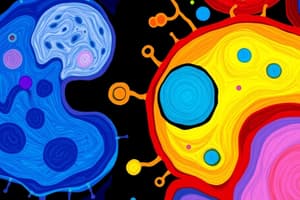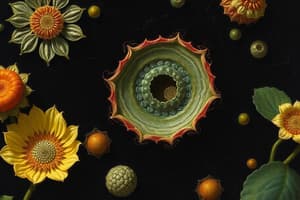Podcast
Questions and Answers
FSH stimulates the production of testosterone in males.
FSH stimulates the production of testosterone in males.
False (B)
In cloning plants using cuttings, the new plant will have a different genetic makeup compared to the parent plant.
In cloning plants using cuttings, the new plant will have a different genetic makeup compared to the parent plant.
False (B)
During the fertilization process, the zygote is formed by the fusion of male and female gametes.
During the fertilization process, the zygote is formed by the fusion of male and female gametes.
True (A)
Embryo development occurs in the placenta.
Embryo development occurs in the placenta.
LH (luteinizing hormone) is responsible for maintaining the uterus lining.
LH (luteinizing hormone) is responsible for maintaining the uterus lining.
Menstrual cycle is regulated by the hormone estrogen only.
Menstrual cycle is regulated by the hormone estrogen only.
During meiosis, the resulting cells have double the number of chromosomes compared to the parent cell.
During meiosis, the resulting cells have double the number of chromosomes compared to the parent cell.
Mitosis is a form of cell division that produces genetically different daughter cells.
Mitosis is a form of cell division that produces genetically different daughter cells.
In a monohybrid cross, the organisms involved are homozygous for the trait being investigated.
In a monohybrid cross, the organisms involved are homozygous for the trait being investigated.
MRNA is formed in the cytoplasm of the cell.
MRNA is formed in the cytoplasm of the cell.
Mutagens are chemicals that decrease the frequency of mutations in DNA.
Mutagens are chemicals that decrease the frequency of mutations in DNA.
The phenotype of an organism is solely determined by its genotype, independent of the environment.
The phenotype of an organism is solely determined by its genotype, independent of the environment.
Cuttings involve planting a branch from a parent plant in compost after removing the upper leaves.
Cuttings involve planting a branch from a parent plant in compost after removing the upper leaves.
During fertilisation, the nucleus of the male gamete fuses with the nucleus of the female gamete.
During fertilisation, the nucleus of the male gamete fuses with the nucleus of the female gamete.
The hormone responsible for stimulating the growth of follicles in the ovary is Luteinising Hormone (LH).
The hormone responsible for stimulating the growth of follicles in the ovary is Luteinising Hormone (LH).
The menstrual cycle involves only the maintenance of the uterus lining and its shedding.
The menstrual cycle involves only the maintenance of the uterus lining and its shedding.
Oestrogen is responsible for causing the release of an egg from the ovary during ovulation.
Oestrogen is responsible for causing the release of an egg from the ovary during ovulation.
Embryo refers to a fully developed organism.
Embryo refers to a fully developed organism.
Flashcards are hidden until you start studying
Study Notes
Reproduction
- Amniotic fluid: surrounds and protects the embryo in the uterus
- Asexual reproduction: involves a single parent, creating genetically identical offspring
- Cuttings: a method of cloning plants, where a branch is cut from a parent plant and replanted in compost
- Embryo: an unborn organism in an early stage of development
- Fertilisation: the fusion of the nucleus of male and female gametes, restoring the full chromosome number
- Gametes: sex cells (sperm and egg cells) with half the usual number of chromosomes
- Menstrual cycle: a monthly cycle in women involving the development of the uterus lining, ovulation, maintenance of the uterus lining, and its shedding
- Oestrogen: the main female reproductive hormone, released by the ovaries, causing growth and repair of the uterus lining and development of secondary sexual characteristics
- Placenta: a temporary organ attached to the lining of the uterus during pregnancy, providing nutrients to the developing embryo
- Pollination: the transfer of pollen grains from the male part of a plant to a female part, enabling fertilisation
- Progesterone: a hormone produced in the ovaries and placenta, maintaining the uterus lining
- Secondary sexual characteristics: features that appear during puberty, differing between males and females (e.g., voice changes, development of breasts, facial hair)
- Sexual reproduction: involves the fusion of male and female gametes, creating genetic variation
- Testosterone: the main male reproductive hormone, produced by the testes, stimulating sperm production and development of male secondary sexual characteristics
- Zygote: a fertilised egg
Inheritance
- Allele: a version of a gene, causing differences in inherited characteristics (e.g., eye colour)
- Chromosome: a long, coiled molecule of DNA, carrying genetic information in the form of genes
- Meiosis: a form of cell division producing gametes, non-identical cells with half the usual number of chromosomes
- Mitosis: a form of cell division producing two genetically identical daughter cells from one parent cell, involved in repair, growth, cloning, and asexual reproduction
- Monohybrid cross: a cross between two organisms, used to investigate the inheritance of one gene
- Mutation: a random change in DNA, resulting in genetic variants
- Natural selection: the process by which the frequency of advantageous traits passed on in genes gradually increases in a population over time
- Nucleus: an organelle in most eukaryotic cells, containing the genetic material and controlling cellular activities
- Phenotype: an organism's observable characteristics, due to interactions of the genotype and the environment
Studying That Suits You
Use AI to generate personalized quizzes and flashcards to suit your learning preferences.



